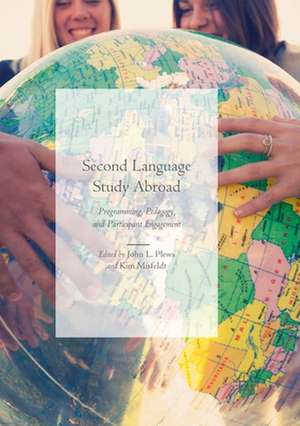Second Language Study Abroad: Programming, Pedagogy, and Participant Engagement
Editat de John L. Plews, Kim Misfeldten Limba Engleză Paperback – 30 ian 2019
| Toate formatele și edițiile | Preț | Express |
|---|---|---|
| Paperback (1) | 639.11 lei 6-8 săpt. | |
| Springer International Publishing – 30 ian 2019 | 639.11 lei 6-8 săpt. | |
| Hardback (1) | 891.95 lei 6-8 săpt. | |
| Springer International Publishing – 5 iun 2018 | 891.95 lei 6-8 săpt. |
Preț: 639.11 lei
Preț vechi: 751.89 lei
-15% Nou
Puncte Express: 959
Preț estimativ în valută:
122.35€ • 126.11$ • 103.16£
122.35€ • 126.11$ • 103.16£
Carte tipărită la comandă
Livrare economică 27 februarie-13 martie
Preluare comenzi: 021 569.72.76
Specificații
ISBN-13: 9783030083786
ISBN-10: 3030083780
Pagini: 414
Ilustrații: XVI, 414 p. 6 illus.
Dimensiuni: 148 x 210 mm
Greutate: 0.51 kg
Ediția:Softcover reprint of the original 1st ed. 2018
Editura: Springer International Publishing
Colecția Palgrave Macmillan
Locul publicării:Cham, Switzerland
ISBN-10: 3030083780
Pagini: 414
Ilustrații: XVI, 414 p. 6 illus.
Dimensiuni: 148 x 210 mm
Greutate: 0.51 kg
Ediția:Softcover reprint of the original 1st ed. 2018
Editura: Springer International Publishing
Colecția Palgrave Macmillan
Locul publicării:Cham, Switzerland
Cuprins
Chapter 1: Introduction: Shifting attention to second language study abroad programming, pedagogy and participant engagement; John L. Plews and Kim Misfeldt.- Part 1: Curriculum and design.- Chapter 2: Positioning year-long study abroad at the centre of the modern languages curriculum: Supporting and assessing learning; Penny Johnson and Simon McKinnon.- Chapter 3: Lessons from 25 years of experimenting with Arabic study abroad: Programme evaluation, culture, location, and curriculum; Matthew T. Bird and R. Kirk Belnap.- Chapter 4: Student-centred second language study abroad for non-traditional sojourners: An Anglophone Caribbean example; Ian Craig.- Part 2: Pedagogical approaches.- Chapter 5: Student awareness of teaching and learning approaches in second language study abroad; John L. Plews, Kim Misfeldt and Feisal Kirumira.- Chapter 6: Increasing student engagement during study abroad through service learning: A view from Japan; Dawn Grimes-MacLellan.- Part 3: Participant experiences and engagement.- Chapter 7: Exploring intercultural learning and second language identities in the ERASMUS context; Ana Beaven and Claudia Borghetti.- Chapter 8: ‘I thought I was prepared’. ERASMUS students’ voices on their transition from L2 learners to L2 users; Sònia Mas-Alcolea.- Chapter 9: Language teachers on study abroad programmes: The characteristics and strategies of those most likely to increase their intercultural communicative competence; Deborah Corder, Annelies Roskvist, Sharon Harvey, and Karen Stacey.- Chapter 10: Adopt a Class: Engagement and reflection during the year abroad; Elizabeth A. Andersen and Sophie Stewart.- Chapter 11: Second language speaking and intercultural friendship formation in study abroad: Experiences and perspectives of international students in the USA; Rebecca K. Smith.- Chapter 12: Gender as a cultural and social construct in language learning during study abroad; Mar Galindo.
Notă biografică
John L. Plews is Professor of German at Saint Mary’s University, Canada, President of the Canadian Association of University Teachers of German, and DAAD Research Ambassador. Dr. Plews publishes in the area of second language curriculum and teaching, second language learner identities, and study abroad for language learners and teachers.
Kim Misfeldt is Professor of German and Vice Dean at the Augustana Campus, University of Alberta, Canada. She directed the Canadian Summer School in Germany 2003-2016. Dr. Misfeldt's excellence in university teaching and educational leadership has been recognized with four teaching awards, including a 3M National Teaching Fellowship and the Charles Dunn COPLAC Award.
Textul de pe ultima copertă
This edited volume explores studying second languages abroad by critically and constructively reviewing established programming, providing theoretical and research-informed support for pedagogical and curriculum interventions, and analysing participant experiences. Over 12 chapters the contributors examine key issues including teaching approaches, learning activities, and relationships in the target language and culture. This book is most distinct in its attempt to promote diversity in approaches and experiences while drawing the common thread of learner- and learning-centredness through each chapter. The contributing authors represent a wide range of academies and discuss study abroad programs and participants in diverse cultural and geographic regions. The book’s international scope will acquaint educators and researchers with a broad variety of practices, stimulate comparison across contexts, and promote innovation.
Caracteristici
Emphasizes theoretical and practical curricular and pedagogical means of attaining study abroad learning objectives Discusses programs and participants concerning various source and receiving countries: Canada, the Caribbean, China, Denmark, Egypt, England, France, Germany, Italy, Japan, Jordan, Morocco, New Zealand, Peru, Spain, the United States, and Wales Provides fresh insights for scholars of Applied Linguistics, as well as for teachers and teacher trainers
